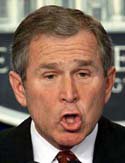I don't do a lot of analyzing or original writing here -- mostly posting links to items I think are overlooked and/or important -- but even so, it has become a chore. Pushing yourself to write is hard enough. It should never feel like a "job".
Also, continued evidence of the dark evil at the heart of the ruling party in the US, coupled with the noise about an inevitable attack on Iran (and the very real possiblity of another "terror attack" to re-rally the citizenry), has made me pretty depressed. It seems like that feeling has only increased since I left the US for Canada.
I urge you to bookmark some of the news links on the right. If you do, you'll probably find everything I would have posted here anyway. My picks for the best sites:
AttytoodAnd (naturally) Joy of Sox for all your Boston Red Sox needs.
Cannonfire
Cursor
The Huffington Post
Left I On The News
Media Matters
Rigorous Intuition
Unclaimed Territory
and especially the Latest Breaking News forum at Democratic Underground (and don't forget Top 10 Conservative Idiots).
